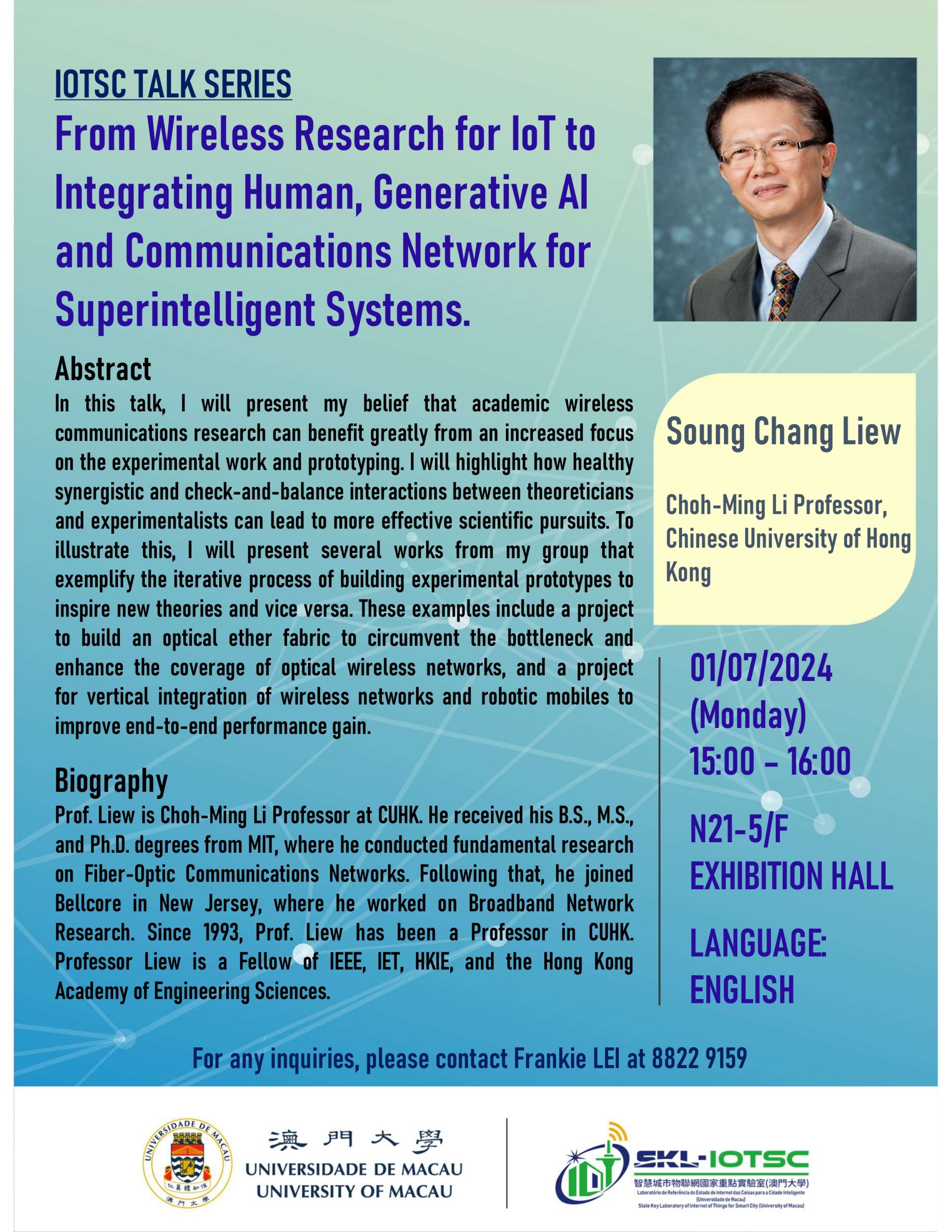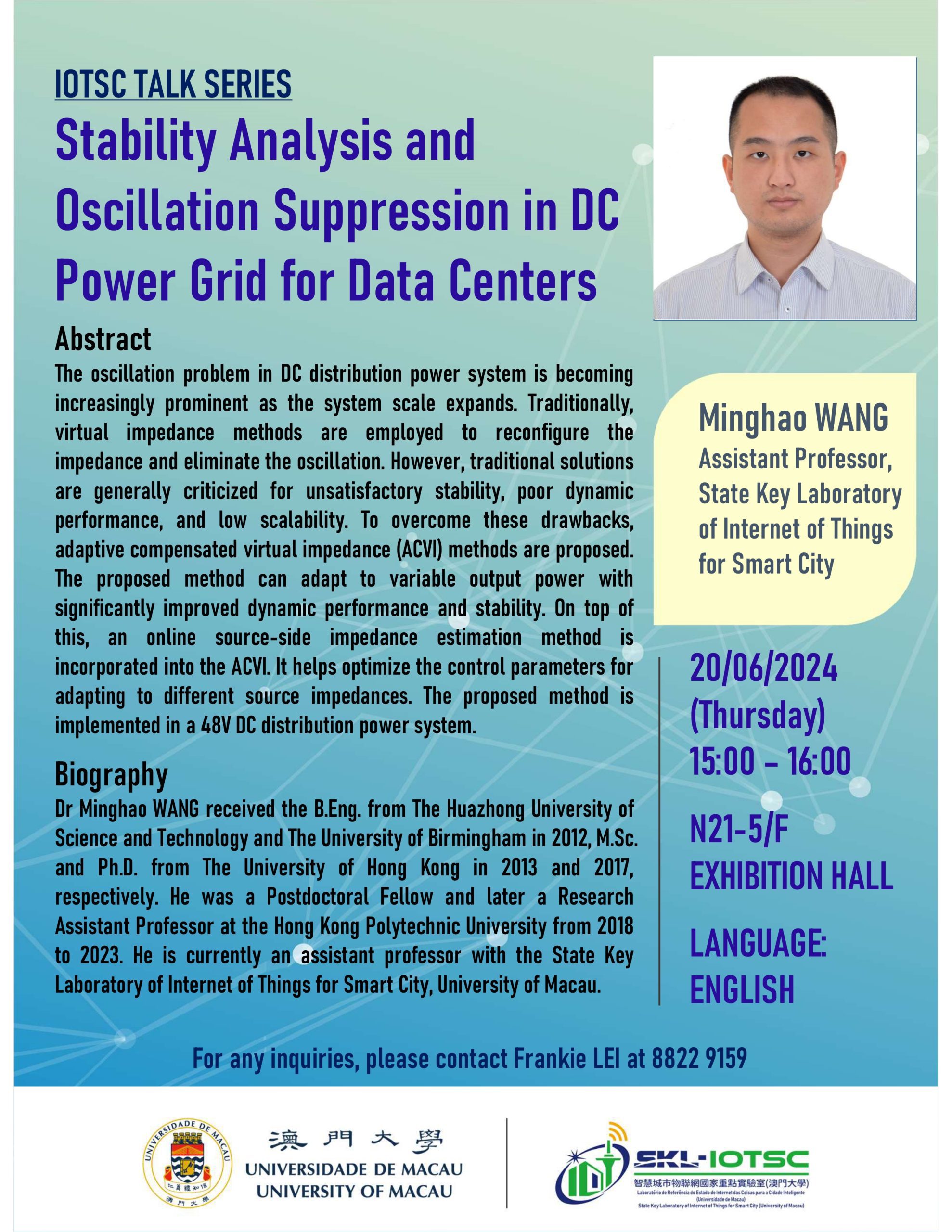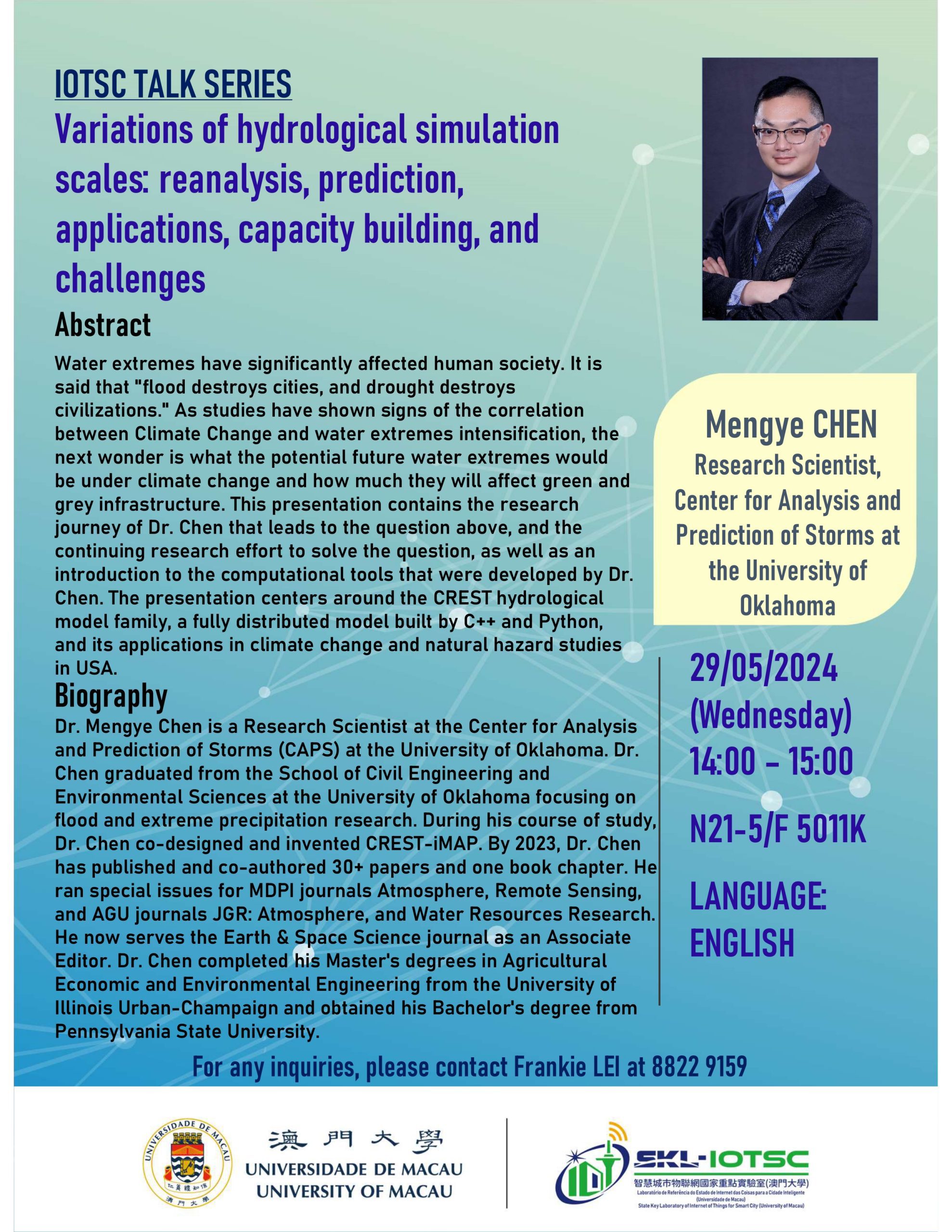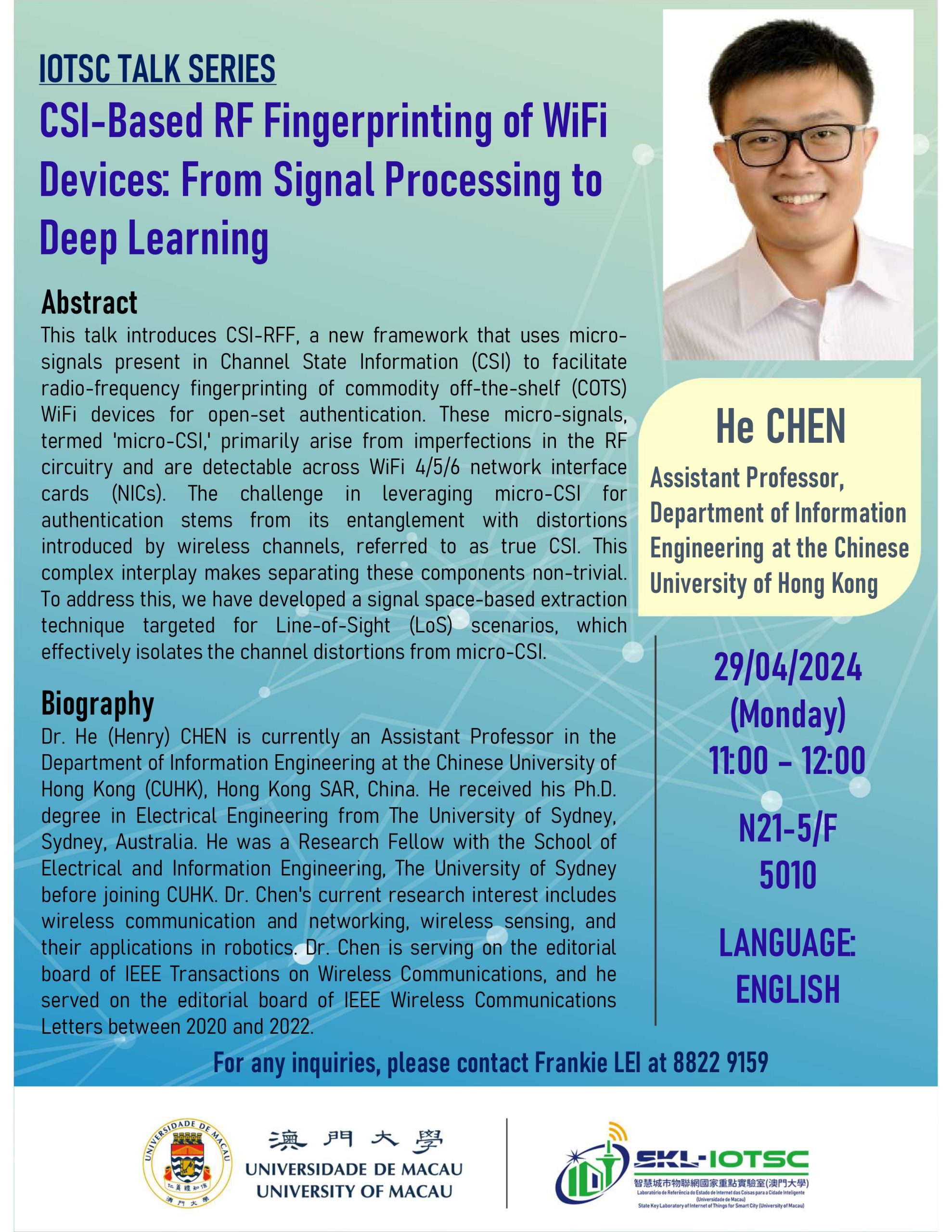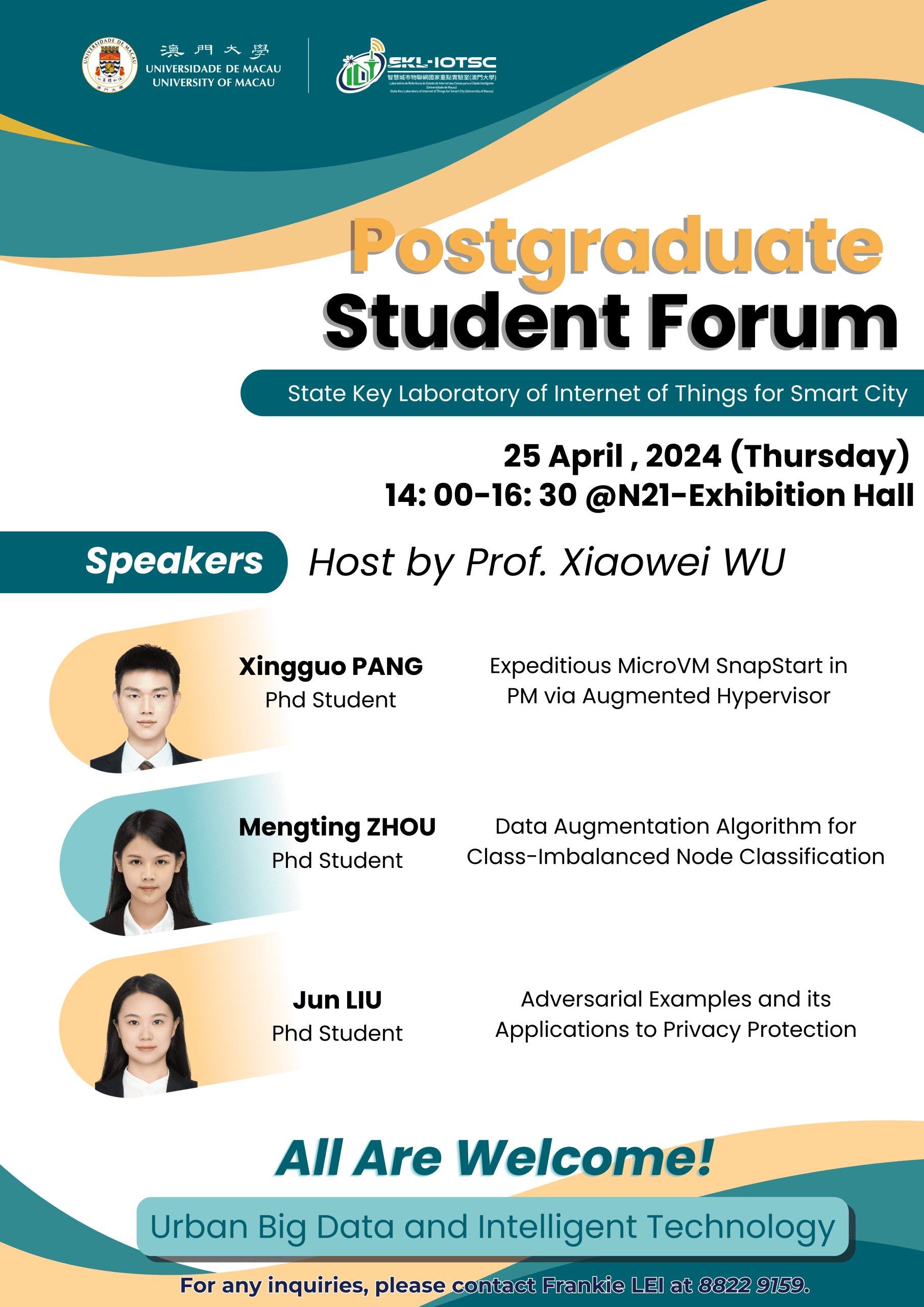IOTSC Postgraduate Forum: Smart Energy
frankielei2024-07-25T00:00:56+08:00
Dear Colleagues and Students,
The State Key Laboratory of Internet of Things for Smart City would like to invite you to join our “IOTSC Postgraduate Forum” on 03/07/2024 (Wednesday). The event aims to bring together postgraduate students from various disciplines to share their research, exchange ideas, and engage in meaningful discussions. We are pleased to invite six outstanding PhD students to give presentations related to Smart Energy.
IOTSC Postgraduate Forum: Smart Energy
Date: 03/07/2024 (Wednesday)
Time: 14:30 – 18:00
Language: English
Venue: N21-5007 (Exhibition Hall)
Host: Prof. Hongcai ZHANG
| Presenters | Abstract |
| Shaohua YANG |
Resilient Control for Demand Response in Smart Grid Against Cyber-Attacks To accommodate power fluctuations caused by renewable energies and maintain the power balance in smart grid, flexible load resources on the demand side have been widely employed to provide flexibility services, a process known as named demand response (DR). To effectively dispatch such distributed flexible load resources, advanced communication, information, and distributed control techniques are developed in the field of DR, transforming DR into a cyber-physical system (CPS). While deep cyber-physical coupling improves the performance of DR, it also introduces cyber-security threats, such as cyber-attacks, which can cause DR system to go out of control, thereby threatening the smart grid’s safe operation. To this end, this talk will focus on analyzing the impact of cyber-attacks on the DR system in smart grid and developing control-based defense schemes to safeguard the flexibility capability of the DR system in harsh cyber environments. |
| Zhenyi WANG |
Improving Model Generalization for Short-Term Customer Load Forecasting with Causal Inference Short-term customer load forecasting is vital for the normal operation of power systems. Unfortunately, conventional machine learning-based forecasting methods are susceptible to generalization issues, manifested in model performance degradation. In recent years, some studies have employed advanced deep learning technology to overcome the aforesaid problems. However, these methods can only alleviate the adverse impacts of generalization, because they are inherently built on unstable relationships. In this talk, we present a causal inference-based method to improve the generalization for customer load forecasting models. Specifically, we first investigate the causal relations in existing methods, and inject the designed load characteristics as an extra model input. Then, we closely inspect the causality in models by using the causal graph, followed by employing the causal intervention with do-calculus to eliminate the spurious correlations. In addition, we present a novel load forecasting framework to realize the causal intervention. Finally, the effectiveness and superiority of our proposed method are validated on a public dataset. |
| Liya MA |
Coordinated Optimization of Power-Communication Coupling Networks for Dispatching Large-Scale Flexible Resources The growth of renewable energies elevates the significance of maintaining system balance and imposes more demands on regulation resources. Flexible loads have been extensively regarded as prospective regulation resources for providing ancillary services within power networks, including frequency regulation, primary reserve, and synchronized reserve. However, the dispatch of flexible loads presents the challenges of frequent data transmission and explosive data volume, leading to substantial pressure on communication networks. To improve the communication performance for providing effective ancillary services, the work focuses on the coordinated optimization of power-communication coupling networks for dispatching large-scale flexible resources. Firstly, this talk will introduce the comprehensive framework of model-operation-planning-engineering derived from our ongoing and upcoming works. Then, this talk will share the recent progress in the equivalent modeling of communication networks and the coordinated operation of coupling networks considering dynamic communication prices. Finally, this talk will provide a concise overview of the future works. |
| Qilin HOU |
Hierarchical Coordinated Control Strategies for Flexible Interconnected Power Grids The integration of renewable energy sources (RESs) into active distribution networks (ADNs) is essential for reducing carbon emissions but presents significant challenges to the traditional power grid’s structure and regulation capability. Employing soft open point for flexible interconnection can enhance power flow regulation capabilty and mitigate the power imbalance among different regions. In modern power grids, power electronic equipment coexists with conventional regulation devices, each with different response times and operational frequencies. Coordinating these heterogeneous controllable devices efficiently, considering their varied characteristics, is a complex challenge. This work addresses these challenges by leveraging the fast response of power electronics to enhance system robustness and stability. This presentation will detail the completed work on hierarchical coordinated volt/var and volt/watt control for ADNs with SOPs considering voltage stability. The future study plan, which emphasizes millisecond-level coordination control considering power electronics dynamics based on a real-time digital system (RTDS), will also be included. |
| Qiaohan SU |
Power Converter’s IGBT Multi-State Reliability Analysis for Low Failure Rate Operation The reliability of power electronics is a cornerstone of modern technology, ensuring the efficient conversion and control of electrical power in applications ranging from renewable energy systems to electric vehicles and industrial automation. As the demand for reliable power electronics continues to grow, the focus on enhancing the durability and performance of switching devices becomes paramount. Switching devices, the most vulnerable component within converters, underscore the critical need to improve their reliability and prolong the power converter’s lifetime. They are subject to various stresses, including thermal, electrical, and environmental factors, which can lead to premature failure and compromise system performance. This talk will discuss the importance of power electronic reliability, emphasizing the vulnerabilities of IGBTs. Sharing our ongoing work utilizes multistate reliability analysis to assess the reliability of these critical components rigorously. Moreover, this talk will show our proposed model for analyzing IGBT reliability, showcasing how multistate reliability analysis offers insights into their performance under different voltage conditions. Finally, this talk will outline future research directions aimed at further improving the reliability of power electronics. |
| Xiaoyi LIU |
A Quasi-Z-Source Based Fault-Tolerant PV Micro-Inverter: Design and Control PV generators are a critical means to decarbonize urban energy systems and alleviate the energy crisis. However, the system reliability is easily compromised by the DC-link capacitor failure and PV module malfunction. To address these problems, a quasi-z-source-based fault-tolerant PV micro-inverter is proposed. The proposed topology features high circuit reliability and fault tolerance with concurrent functions of active power decoupling and differential PV module current manipulation. In this talk, the circuit design will be elaborated. The operation modes of the topology as well as its modulation scheme will be introduced. Based on the circuit models, the control strategy of the proposed converter will be discussed. Finally, simulation results will be analyzed to demonstrate the concurrent functions of APD and fault-resilient operation. |
For enquiries: Tel: 8822 9159
Email: frankielei@um.edu.mo
Best Regards,
State Key Laboratory of Internet of Things for Smart City
